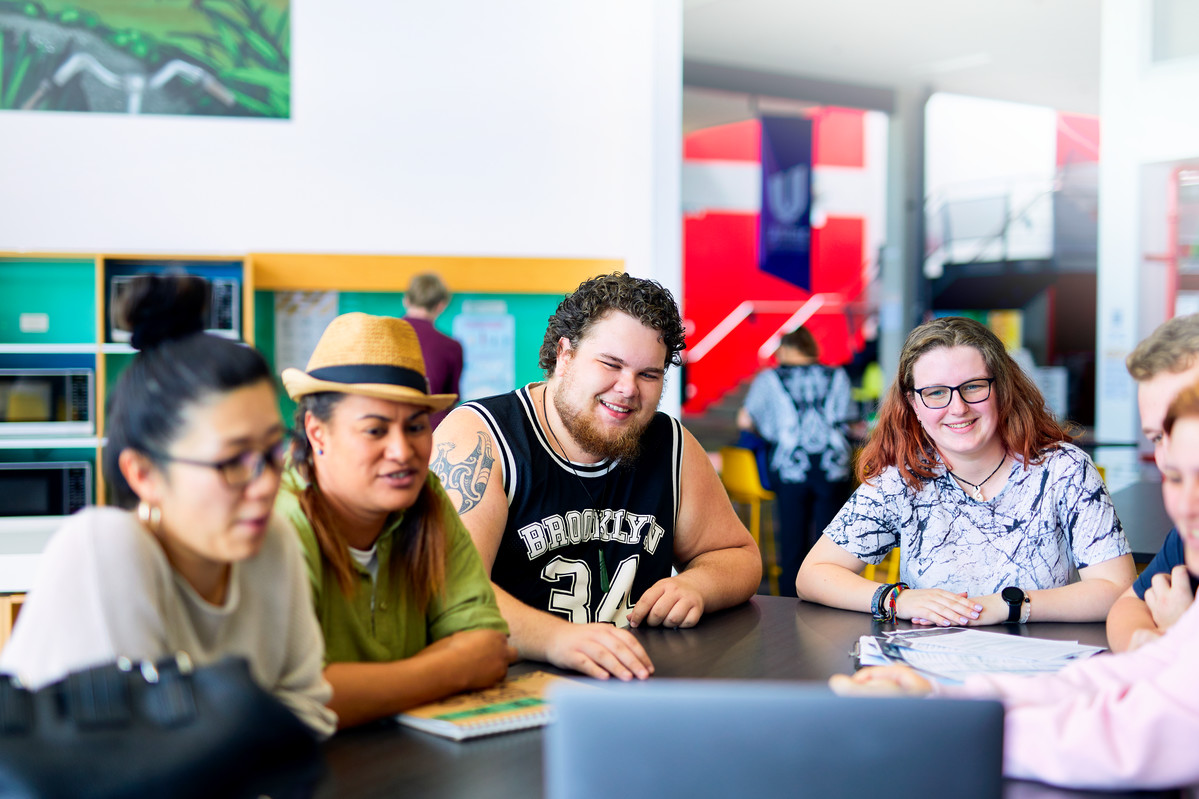Programme overview
Start your journey into higher education or employment with the New Zealand Certificate in Study and Employment Pathways (Level 3). This programme equips you with practical skills, confidence, and knowledge to pursue further studies or step into the workforce.
While it’s not equivalent to NCEA Level 3, successful completion will open doors to higher-level programs. Please see 'Pathways to Further Study' below to see where the New Zealand Certificate in Study and Employment Pathways (Level 3), could take you.
Highlights
- Supportive Environment: Learn in a welcoming setting with supportive, knowledgeable lecturers.
- Skills for Success: Gain study skills, foundational knowledge, and confidence for further study and the workplace.
- Engaging Learning Methods: Experience group and individual work, seminars, debates, whānau hui, and self-directed learning.
- Pathway to Higher-Level Programs: Successfully complete this certificate and apply for higher-level programs.
To complete this programme you need to pass four courses, totalling 60 credits. Each course is worth 15 credits.
Please note: International students who graduate will NOT be eligible for a post-study work visa upon completion of this programme.
Pathways
The New Zealand Certificate in Study and Employment Pathways (Level 3) offers six pathways designed to equip you with the skills you need to progress into your choice of higher-level programmes.
Engineering & Construction
The courses in this pathway are appropriate for Engineering, Construction Management, Land Surveying, Quantity Surveying or similar.
Course selection will be discussed after the Skills Review, will include:
- Academic Study Skills (Engineering & Construction)
- Physics
- Developing Mathematical Thinking
- Understanding Algebra
General - Mount Albert
Includes Art & Design, Architecture, Business, Computing, Early Childhood Education, Social Work, Trades and Science.
Students interested in these or similar pathways, or who are not sure of their career pathway, will be offered the following:
- Academic Study Skills (General)
- Foundation Maths
- Numeracy Skills
- Developing Mathematical Thinking
- Projects in Creative Arts
- Understanding Algebra
- Bioscience
- Introduction to Business
- Psychology
- Art and Design
- Introduction to Computing Skills
General - Waitākere
Includes Science and Health.
Students interested in these or similar pathways, will be offered the following:
- Academic Study Skills (General)
- Bioscience
- Psychology
- Foundation Maths
- Nursing Maths
Pathways to Further Study
Upon completing the New Zealand Certificate in Study and Employment Pathways (Level 3), you’ll have a pathway to study in fields such as:
- Architecture and architectural technology
- Art and Design
- Business
- Computing
- Construction management and quantity surveying
- Early childhood education
- Engineering (electrical and civil)
- Environmental and animal sciences
- Land surveying
- Nursing and medical imaging
- Screen arts, acting, and technical production
- Social work and community development
- Sport, exercise and recreation
- Trades (automotive, mechanical, carpentry, plumbing, gasfitting, and drainlaying)
Skills Review Session
To ensure you’re enrolled in the right courses, we conduct a skills review session, including online quizzes to assess reading, writing, and math skills. Our team will work with you to identify the best courses, setting you up for success.
Youth Guarantee Scheme
If you are between 16 and 19 years old and did not achieve NCEA Level 2 at high school, you may be eligible to study for free for one year under the Youth Guarantee Scheme. We have up to 60 places available. To see if you qualify, take a look at the scholarship page here: Youth Guarantee Scheme.
Admission requirements
To apply for this programme, you must meet the following criteria:
- General, special, or discretionary admission requirements; plus
- English language requirements; and
- You will need to complete a pre-entry Skills Review session.
General Admission
- You’ve completed at least 3 years of secondary school, and
- You’ll be 16 years old or older when the programme starts.
If you’re under 16, you’ll need to complete an Early Release Exemption form.
Special Admission
- Show evidence of your work, life, or study experience (e.g., a previous qualification or job history).
- You’ll be 20 years old or older when the programme starts.
Discretionary Admission
- You’re under 20 and don’t meet the general admission requirements.
- Your application will focus on how prepared you are for study.
English Language Requirements
- NCEA Level 1 English: 8 credits
International applicants:
- IELTS (Academic) score of 5.0 in all bands from a single test within the last 2 years, or an equivalent qualification.
Skills review
To ensure you’re enrolled in the right courses, we conduct a skills review session. During this session, we will check your current reading, writing and maths skills and will give you the opportunity to talk to our friendly academic staff about your job plans and you can find out more about what Unitec can offer you. You can book your Skills review session here.
For more information download the programme regulations:
Courses and timetables
For more details on the courses including timetables, please click on the course names below.




